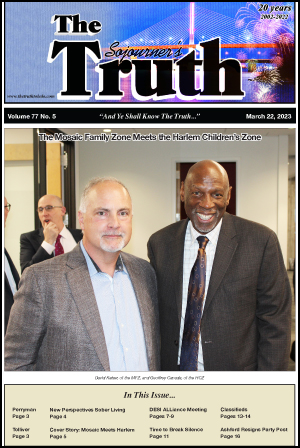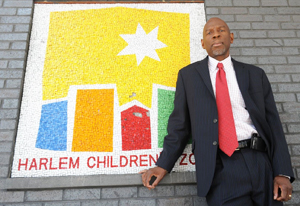
By Fletcher Word
The Truth Editor
First, for the good news! And the good news is very good indeed. The Mosaic Family Zone, which is leading an effort to transform Toledo’s Old South End by addressing the needs of families in poverty, particularly by working with children from birth, or cradle to career, has entered into a formal partnership with the Harlem Children’s Zone
That partnership, one of just four such arrangements the HCZ has approved across the country, will bring support and enable Mosaic to continue model its program along the lines that has brought such success to the community served by the HCZ.
Established more than 20 years ago, the Harlem Children’s Zone has implemented a program of working with families in poverty in its 97-block area that has the children of those families accepted into college at a rate of 97 percent.
Now, for the not so good news! It won’t be easy … or cheap.
The Harlem Children Zone founder and president, Geoffrey Canada, spoke to a group of Toledo civic leaders on Tuesday, March 14, at the offices of Hart Associates and delivered a message of just how difficult it is to change a community’s will and ability to get the children of the underserved population educated and out of poverty. He also shared his thoughts about just how worthwhile that endeavor is.
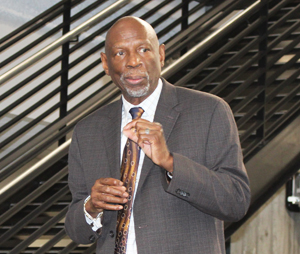
“Children and families have been stuck in poverty for two reasons,” said Canada as he opened his address. Those two reasons are the complexity of the problem and the scale of the effort needed.
“We’ve tried to find out one single strategy to work,” he said of the complexity. “But we’ve misunderstood the depth of the problem – poverty is complex and folks don’t have a strategy for getting us all together to solve the problems – you’ve got to come together.”
As for the scale of the problem, Canada noted that an organization that is working well can typically save hundreds of children “but not thousands – you can’t do this on the cheap.”
“If you care about your city, you have to make an investment in children,” continued Canada, who emphasized throughout his talk that the initial investment to ensure a good cradle to college education was not nearly as expensive as the costs to society of trying to repair the damage done by the income gap the country experiences. Those are the costs of welfare programs and incarceration, for example.
“Let’s fix this system, through education, social services, parks and recreation,” said Canada, noting the all-encompassing effort such a change takes. “Start at birth and stay with these kids until we get them through college.”
Canada repeatedly emphasized the fact that his program, the HCZ, sets a goal of preparing kids for college and preparing the neighborhood at large for the expectation that the children of that neighborhood will be expected to go to college, just like the wealthier neighborhoods expect their children to attend college. Vocational education is not part of his vision for the children of the Harlem Children’s Zone.
“I reject out of hand a plan B,” he said. “The vocational plan is not an option. Once you get into college, you think differently about yourself. You need to have an effort on the ground to get kids into college and I will challenge anybody to come to Harlem and see how this is working.”
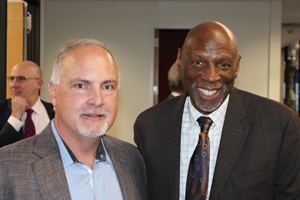
Indeed, according to statistics compiled by the New York State Department of Education, graduates of the HCZ attend college at a rate well over 90 percent and after two decades of work in the central Harlem community, the area is thriving, crime is down, development is booming, families and businesses are moving into the area and it’s normal for children to stay in school and go to college – and many even return to find jobs and start their careers.
That’s a model that David Kaiser and the Mosaic Family Zone will continue to emulate..
Mosaic’s information states that “low-income families need a variety of supports from the birth of a baby and lasting until the child achieves meaningful adult employment.”
To that end, Mosaic has enlisted the aid of agencies and organizations sch as Toledo Public Schools, Toledo Tomorrow and the Art Tatum Zone (Christine and Calvin Sweeney) in its journey to change a neighborhood – the Old South End neighborhood.
“This is the way to end poverty,” says Kaiser, executive director of the Mosaic Family Zone and the pastor and founder of Mosaic Ministries. “Start when the children are born and stick with them until they are 24 years old.”
As Kaiser describes the program he and his team have been developing over the past 15 years, “The pattern starts at pre-birth and is both wholistic and longitudinal – try to get children the best education possible, get them into the best college possible and into the best career imaginable.”
If that prescription for turning around the fortunes of a depressed community sounds similar to something that the legendary founder of the Harlem Children’s Zone, Geoffrey Canada, might say, it is not a coincidence.
“The Mosaic Family Zone is leading an effort to transform Toledo’s Old South End by working with families over the course of a lifetime,” according to the organization’s literature. “Low-income families need a variety of supports from the birth of a baby and lasting until the child achieves meaningful adult employment.”
David Kaiser and his wife Kelly arrived in the Old South End 16 years ago from their rural home to establish a school in a former church, the Western Avenue Baptist Church. “We were overwhelmed with problems at the start,” recalls Kaiser. The poverty, the struggle of residents of the neighborhood to survive, surprised and startled the couple.
Inspired by the HCZ model that they read about in those early days, they set about their mission with a goal of developing a wholistic approach to neighborhood revitalization.
Baby University, which began operations in 2011 with funding from the ProMedica Advocacy Fund, and in partnership with Cherry Street Mission, was the natural first step that Mosaic Ministries established in developing a Cradle to Purpose pipeline.
The Old South End is just the place for such a wholistic approach. The population, currently 28 percent Latino, 18 percent African American and 54 percent Caucasian, is one of the most impoverished areas of the city.
Baby University works with parents in that neighborhood to educate and support them. The goal is to introduce parenting skills that help them prepare their children for the school experience – reading to children for a certain amount of time daily, seeking proper healthcare for their children, disciplining children appropriately – through productive rather than abusive methods.
Along the way over 900 adults have graduated from Baby University by “demonstrating significant improvements in reading to their children, parenting skills, family stability and empathy,” according to Kaiser.
Then came pre-school for zero to five-year olds – the Mosaic Early Childhood Learning Center – as the organization continues to deal with the problem of generational poverty by working with pre-schoolers to address the three “markers” indicating whether children of low-income families are keeping up with their more advantaged counterparts.
Those three markers are: first the word gap that low-income children face by the age of three. Studies of this problem note that children at this age have heard millions fewer words than their counterparts and have command of perhaps about 10 percent of the number of words.
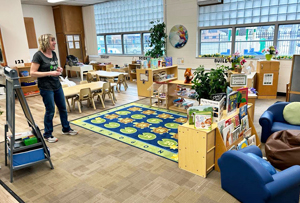
The second marker is kindergarten readiness – a measure of the success that children have on the tests they take when entering school. Nationally low-income children test 60 percent lower than their middle-income peers. A Toledo Public Schools report indicates that 82 percent of incoming kindergarteners are ready to start school.
The third marker is the performance on third grade reading tests, a typically reliable indicator of future academic success and a predictor of major life difficult outcomes such as early pregnancies, incarceration rates and drug and alcohol abuse.
The third phase in the Mosaic plan will be the Mosaic Classical Academy for five-to-14 year olds – a formal state charter school.
All of these programs will include “wrap-around” programs for children and families. Summer enrichment, after-school and mentoring programs for the youngsters; family, social service and wellness programs for the parents along with the engagement, collaboration and support of local organizations such as Sofia Quintero, the Believe Center, Adelante, South Toledo Library, Toledo Tomorrow, the Art Tatum Zone, etc.
Again, none of this is cheap, notes Kaiser, much of whose time is spent fundraising – no easy task in Toledo. The societal problem, however, is that the costs to remedy or mask the ills besetting low-income families takes so much more money.
Geoffrey Canada notes that the cost in New York City of jailing a citizen for one year is in the range of $400,000. Jail is not nearly as expensive in other locations but the yearly costs of incarcerating an individual everywhere in the USA are more than 10 times more expensive than educating a child for that same length of time.
“It is easier to raise strong children than to fix broken adults,” said Frederick Douglas – as cited in the Mosaic literature.
“If we make the investments up front,” says Kaiser, “we are giving kids a start.”
Canada visited Toledo several years ago for a function at the Renaissance Hotel and was introduced to the Mosaic Family Zone via their website and liked what he saw. He requested more contact with Mosaic staff over the next few months through zoom meetings and eventually informed them that the HCZ would like to work with them. That commitment will mean bringing them into the HCZ network and providing them with funding, through the tech billionaires he has gained access to, says Kaiser.
The partnership between Mosaic and HCZ means that Toledo is one of only four cities selected from around the nation – Poughkeepsie, NY, Hartford, CT; Orland, FL – to be so honored.
The partnership also ensures that Mosaic will be able to continue its mission of addressing poverty, not as an adult problem, but through working with children in poverty from birth and continue to have the success that the Harlem Children’s Zone has achieved.
“We need to stop pulling people out of the river. We need to go upstream and prevent them from falling in.” Desmond Tutu – as cited in the Mosaic literature.

